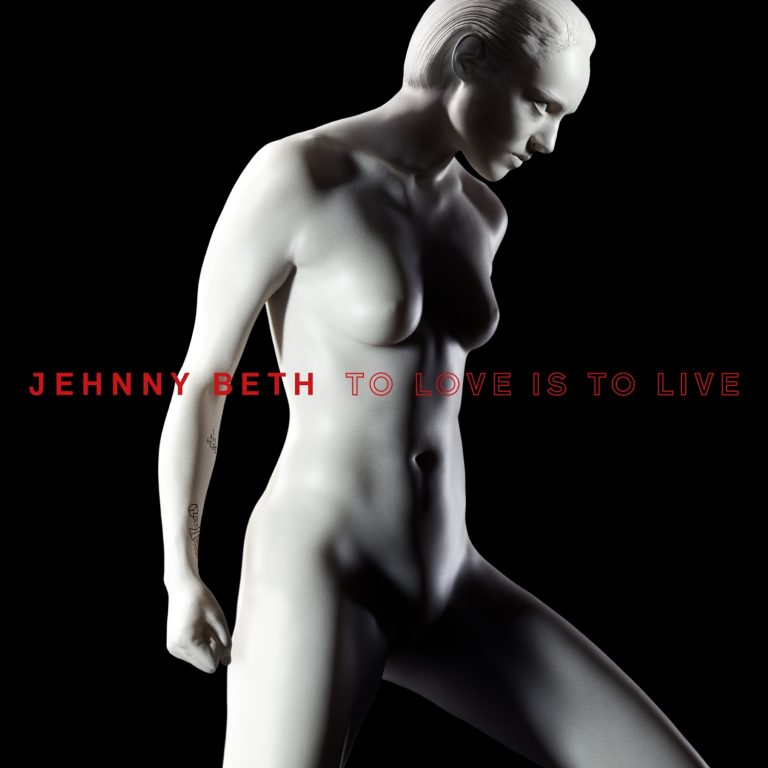For half a decade, two albums and countless shows, Jehnny Beth was the iconic lead singer of punk band Savages, spitting and writhing atop the band’s razor guitars, guiding them to critical acclaim and vocal fandom. But, it was with “Adore”, the stripped-back single from their second album, that Savages garnered the most attention. An outlier in their catalogue due to Jehnny’s unabashed emoting and the relatively subdued backing, “Adore” transcended their status as in-your-face punks to show up on TV shows like Riverdale and Gotham. There is a temptation to draw a parallel between the success of “Adore” and Jehnny Beth’s decision to cut out on her own and create her debut solo album To Love is To Live.
That’s not to say that To Love is To Live doesn’t have its visceral and intense moments – there are plenty – but this is an album built around Jehnny Beth; she remains the focal point throughout. While working with Savages, Jehnny served as the sharpened tip of the band’s rock thrust; now solo, she and her team of producers – Flood, Atticus Ross and long-time collaborator Johnny Hostile – have turned that point inwards on herself. On To Love is To Live they’ve crafted a set of songs that utilises thunderous beats, monolithic synths, a few guitars and some piano to form a reflective fortress around the singer, allowing her to maintain her power even when she’s at her most vulnerable.
To Love is To Live starts in bold fashion with “I Am”, where Jehnny positions herself as a leader of men, stating “I am the ocean / I am the moon / I am dying far too soon.” Whether intentional or not, the immediate comparison is with French hero Joan of Arc, especially as she sings “I am young and I’m innocent / And I’m burning inside”, while strings crackle and fade around her. It’s a bravado that is familiar from her previous work, but this time she seems more fallible and human.
This mortal shade is one that suits Jehnny perfectly, and To Love is To Live is at its strongest when she gets to revel in it. “Innocence” is a perfect example; Jehnny cruelly reflects on her self-doubt, heartlessness and Catholic upbringing, while synth bass stabs all around, casting dramatic shadows. “Flower” outright brandishes her uncertainty – something you never would have associated with her in the past – as she admits “I’m not sure how to reach her / I’m not sure how to touch her,” warm synth caresses and delicate electronics conveying the crackling sexuality.
This desire to show more of herself does lead her into a couple of on-the-nose moments, but the production and her commitment usually help pull it off. “Heroine” is a highlight, as it pairs Flume’s driving and wispy production with her simple plea “All I want is to be a heroine,” creating a haunting anthem. Early single “I’m The Man” doesn’t scratch much deeper than its title, but the brash electro-punk backing enables it to connect cleanly like a sonic uppercut.
Only when Jehnny and her collaborators tip the scales a bit too far towards full-on or stripped-back do they come unstuck. “How Could You” is the closest this album comes to Jehnny’s former band, but it serves as an example of why she couldn’t fully express herself in that tumult, as her words are lost in the furore. At the other end of the spectrum are the couple of piano ballads; “The Rooms” is not helped by being sandwiched between the towering songs “I’m The Man” and “Heroine”, but that aside her tale about the relationships between men and women lacks teeth or direction. “The French Countryside” is a more successful, as arpeggios paint a lovely landscape while Jehnny pines openly for her homeland, but it still feels a bit damp compared to the maximalist productions all around.
To Love is To Live finishes with “Human”, a song where Jehnny laments “I used to be a human being / now I live in the web,” and later “My dreams are filled with snippets of code / I spend hours daily in a panic mode.” It’s an unexpected sci-fi turn so late in the album, and seems like it could well be the jumping off point for a whole new set of songs. But then, Jehnny loops the album back round to its beginning again, repeating the lines that opened the record, “I am naked all the time / I am burning inside” – inscrutable as ever.
Although it seems Jehnny Beth has decided to go solo to express more of her vulnerabilities, by the end of To Love is To Live it’s hard to say whether we actually feel any closer to her. However, it also shows her chameleonic abilities as a vocalist, as she’s working with different styles and productions yet still sounding urgent. Many of these could provide a template for her solo work in the future, but given how unpredictable she has been to this point, you wouldn’t dare second guess her.

